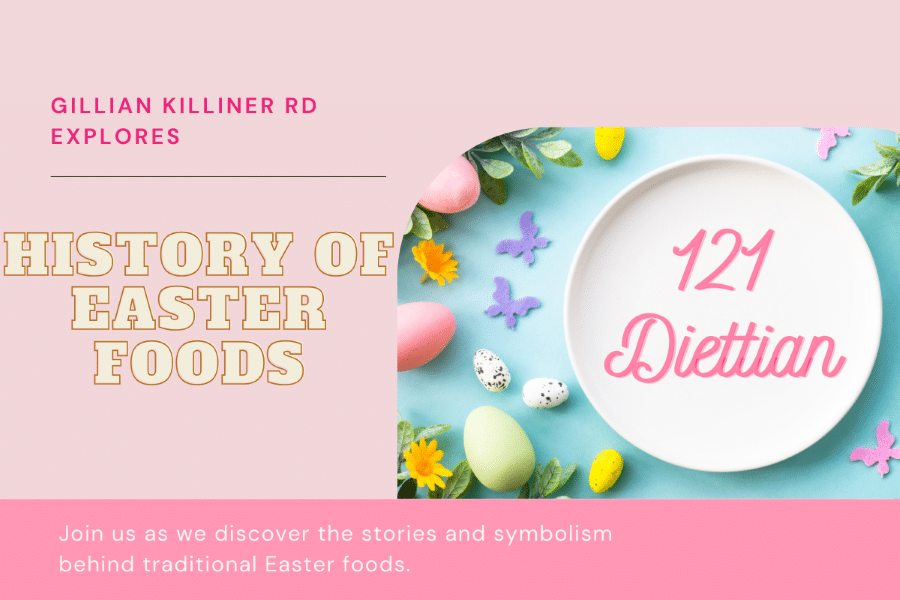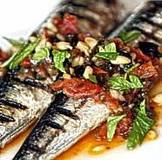Traditional Foods for Easter and Their Meanings

Traditional Foods for Easter and their meanings
Diet and Eyesight :The Vital Connection

Today, I am going to explore a topic that’s often overlooked: the relationship between Diet & Eyesight. It is so important and I can’t believe I haven’t talked about it before! Your eyes are a windows to your overall health and can really impact your quality of life if you find yourself with an eye related health problem. Welcome if you are new here to 121 Dietitian. I’m Gillian Killiner, founder of 121 Dietitian, and I have been writing blogs for many years on various topics alongside my clinical work. So hopefully you will find some information relevant or interesting to you. Understanding the Basics – Diet & Eyesight So what does the eye do? The human eye is a complex organ. It works like a camera by capturing and processing light, which is then transformed into visual information that our brain can understand. Its well-being relies on a variety of nutrients to function optimally. These nutrients can be obtained through a balanced diet, and they play a crucial role in maintaining good eyesight throughout your life. So lets look first at foods that could impact negatively on your eye health: 1. Sugary Drinks Sugary fizzy drinks, energy drinks, sweet tea, and lemonade, high fructose syrups. These beverages are often loaded with sugar, and excessive sugar consumption can increase your risk of developing type 2 diabetes and heart disease. These conditions, in turn, can lead to eye problems like diabetic retinopathy and age-related macular degeneration (AMD). Just to put things in perspective, a single soft drink can contain a whopping 37 grams of sugar! So, it’s wise to be mindful of how many sodas you consume daily. 2. Fish & Shellfish Fish and shellfish are generally considered healthy sources of protein and essential nutrients. However, they do contain small amounts of mercury. While this isn’t a major concern for most people, certain groups are more susceptible to health problems related to mercury exposure. This includes pregnant women, nursing mothers, and children. For these individuals, it’s recommended to limit fish intake to 2 portions per week to reduce the risk of eye damage. 3. Bread Products Bread products, such as white bread and pasta, are daily dietary staples for many of us. However, they contain simple carbohydrates that are digested quickly, leading to rapid spikes in blood sugar levels. This can contribute to chronic inflammation, a condition linked to AMD. If you’re worried about the impact of bread products on your eye health, consider limiting your consumption and exploring whole-grain alternatives. 4. Prepackaged Foods Prepackaged foods are convenient but often not healthy and frequently contain high levels of sodium, which can lead to high blood pressure. Elevated blood pressure, can damage your retina and result in a condition known as hypertensive retinopathy. To reduce your sodium intake, look for “low sodium” labels on canned goods, soups, and sauces when food shopping, but more importantly rethink the amount you use of these products and consider how you can cook with natural ingredients when possible. 5. Processed Meat Processed meats like bacon, deli meats, sausages are loved by many but can be high in sodium as well. Beyond contributing to hypertensive retinopathy, excessive sodium intake can cause choroidopathy, characterized by fluid buildup under the retina, and neuropathy, which can lead to blockages in blood flow. So the message here is to watch your salt and sugar intake as this can go a long way in preserving your eye health. So what can you eat instead? Thankfully there is an abundant variety of foods and fluids that can assist and nourish the eyes. Key Nutrients for Healthy Eyes Preventing Age-Related Eye Conditions: Consuming a diet rich in antioxidants, such as vitamins C and E, can help protect your eyes from the oxidative stress associated with aging and reduce the risk of cataracts and AMD. Maintaining Eye Moisture: Omega-3 fatty acids help keep your eyes moist and reduce the risk of dry eye syndrome, which can be uncomfortable and affect your vision. Enhancing Night Vision: Adequate intake of vitamin A ensures your eyes can adapt to low-light conditions, which is crucial for night vision. Shielding Against Harmful Light: Lutein, zeaxanthin, and beta-carotene act as natural filters, protecting your eyes from harmful ultraviolet (UV) and blue light. Promoting Eye Tissue Health: Nutrients like zinc support the health of eye tissues and may reduce the risk of conditions like macular degeneration. Conclusion – Diet & Eyesight Our eyes are invaluable, and protecting our vision should be an integral part of our daily life. A diet rich in the right nutrients can play a pivotal role in maintaining and safeguarding eyesight. By incorporating foods rich in vitamins A, C, E, omega-3 fatty acids, zinc, and carotenoids into your daily meals, you are investing in the long-term health of your eyes. At 121 Dietitian, we understand the importance of nutrition in promoting overall well-being, including eye health. If you’d like personalized guidance on optimizing your diet for better eyesight or any other nutritional concerns, don’t hesitate to reach out. Remember, a nutritious diet isn’t just about looking good; it’s about seeing the world around you safely for years to come. If you want to book your programme TODAY we would love to help you. You can book a 121 Dietitian Programme today by clicking on the link below CONTACT TODAY Vitamin A: This is perhaps the most well-known nutrient for eye health. Vitamin A helps maintain the health of your cornea, the outermost layer of your eye. A deficiency in vitamin A can lead to night blindness and other vision problems. Vitamin A is found as retinol in meats, dairy, eggs and Beta-carotene in fruits and vegetables. Vitamin C: Found in fruits and vegetables like oranges, strawberries, and bell peppers, vitamin C supports the blood vessels in your eyes and can help prevent cataracts and age-related macular degeneration (AMD). Vitamin E: Nuts, seeds, and leafy greens are rich sources of vitamin E, which is known for its antioxidant properties. Antioxidants
Celebrating World Porridge Day: A Nutritional Delight! 🥣

Porridge – We Love Ya!… Porridge, the ultimate comfort food, is deservedly taking the spotlight on October 10th as we celebrate World Porridge Day! As a leading Dietitian, I’m thrilled to share the wonders of this versatile dish with you. So lets celebrate health together with why you should eat poridge! Why Porridge Rocks: Nutrient Powerhouse: Porridge is packed with essential nutrients like fibre, vitamins, and minerals, making it a perfect start to your day [1]. Heart Health: Its soluble fiber content helps lower cholesterol levels, promoting a healthy heart. Did you know porridge oats are wholegrains and contain a soluble fibre called beta-glucan, which can help lower your cholesterol level if you have 3g or more of it daily, as part of a healthy diet. (A 40g serving of porridge oats contains 2g of beta-glucan.) Energy Boost: Porridge provides a steady release of energy, keeping you fueled and focused throughout the day – no reaching for the snacks straight after breakfast. Customizable: Sweet or savoury -using fruits, nuts and spices, you can personalize your porridge, add to soups/sauces making it a versatile and tasty treat. Celebrate with a Porridge Party! Let’s turn World Porridge Day into a memorable event! Gather your friends, schoolmates, or community members for a Porridge Party. Share recipes, swap ideas, and savor different porridge variations. Don’t forget to capture the moments and spread the joy on social media using #PorridgeDayCelebration! A Porridge Recipe we at 121 Dietitian love… Oat Fibre Pancakes 1 large ripe banana 1-2 eggs depending on size 1/4 cup (can use gluten-free) oats (blitz in a blender for smoother flour consistency) 1tbsp of milled flaxseed 1 tbsp chia seeds pinch of salt pinch of cinnamon 1 spoon almond butter (optional) butter for cooking InstructionsMash the banana with a fork, break and whisk in the eggs, oats, salt seeds and cinnamon until smooth. Add the nut butter and swirl into the batter.Heat a teaspoon or oil/butter in a pan over medium-low heat. Cook for about 2 minutes, on medium heat until set. Cook on the other side for another 30 seconds.Serve with berries. Enjoy! Let’s make this World Porridge Day a celebration of health, taste, and togetherness! Happy porridge-making, everyone! 🌐 Sources AwarenessDays – World Porridge Day 2023 NetworkLeeds – Celebrate World Porridge Day with Mary’s Meals National Today – World Porridge Day Twinkl – World Porridge Day 2023 | Teaching Resources Chelmsford Star Cooperative – Celebrate World Porridge Day
Constipation Relief

5 Evidence-Based Constipation Home Remedies by a Registered Dietitian Constipation is a common issue that affects one in five people following a Western diet. If you have ever suffered with this you will know how unpleasant the feeling is. Maybe you are currently suffering with ongoing constipation and are in need of some guidance, so please read on. I’m Gillian Killiner, a registered dietitian with 26 years of experience in helping thousands of individuals with their dietary and health needs. In this blog post, I share five evidence-based tips to assist with constipation. But first, let’s define constipation. What is Constipation? Constipation occurs when you haven’t had a bowel movement for more than three times in a week. You can assess your bowel movements by using a stool chart to evaluate consistency and type. Typically, constipated stools are hard, small lumps, or pebble-like Type 1 and 2. What is a normal bowel movement frequency as defined by the NHS? “It is normal to pass a stool everyday up to every 3 days; stools should be soft and easy to pass. You should not need to strain to pass a stool. Some people pass a stool once a day and some twice these are both normal.” So what factors in a Western diet contribute to constipation? Dietary Factors 1. Hydration for Constipation is Key One of the first and most crucial tips for relieving constipation is to stay adequately hydrated. Many people underestimate the importance of drinking enough fluids. It’s easy to forget to drink when we switch off our thirst receptors. To combat this, keep a drink, such as a glass or bottle of water, with you throughout the day. Aim for 1.5 litres minimum. You can also include herbal teas and coffee, but limit them to no more than four cups a day, and avoid making them overly strong. Excessive caffeine can contribute to dehydration, which worsens constipation. 2. Load Up on Fruits and Vegetables Consuming an ample amount of fruits and vegetables is another essential strategy for relieving constipation. Begin your day with a breakfast rich in vegetables or add fruits to your cereal. Incorporate fruits and vegetables into your meals and snacks as much as possible. Variety and color in your diet are key. These foods provide essential antioxidants, vitamins, minerals, and fibre, all of which promote healthy bowel movements. Don’t forget to consider the fibre content in your diet, which can come from sources like nuts, seeds, beans, pulses, and high-fiber grains. Aim for an average of 30 grams of fiber daily to keep your bowels moving smoothly. 3. Dried Fruits as a Natural Solution Dried fruits like prunes, dates, and raisins can also be valuable additions to your diet when dealing with constipation. They are rich in fiber and natural sugars, which can help stimulate bowel movements. Including these dried fruits in your diet can be a tasty and effective way to alleviate constipation, just keep to small portions. Lifestyle Factors 4. Embrace Exercise for Constipation Exercise plays a vital role in maintaining regular bowel movements. It helps reduce transit time, meaning food moves through your digestive system more quickly. This faster gut transit leads to improved bowel regularity. Additionally, exercise promotes the growth of beneficial gut bacteria, strengthening abdominal muscles, and overall gastrointestinal health. Aim for regular physical activity to reap these benefits. 5. Listen to Your Body Lastly, don’t ignore your body’s signals when it’s time to go to the toilet. Often, the morning after breakfast is the most opportune time to have a bowel movement. However, due to our busy lives and schedules, we sometimes ignore these cues. It’s essential not to hold onto stool if you feel the urge to go. Ignoring these signals can have negative long-term consequences. If you find yourself straining during bowel movements, consider changing your sitting position on the toilet. Squatting, for example, can create a more natural alignment for easier passage of stool. Constipation Conclusion Constipation is a common issue, but it can be effectively managed with evidence-based strategies. These five tips, including staying hydrated, consuming ample fruits and vegetables, incorporating dried fruits, embracing exercise, and listening to your body, can make a significant difference in your digestive health. Remember that there are numerous dietary, lifestyle, and supplement options available to alleviate constipation. The tips mentioned here provide a solid starting point. There are many more additional strategies out there so do get in touch if you are struggling. Often we see patients with alternating constipation and diarrhoea, which is so hard to live with. Not being able to predict how your day will go and fearful of your bowels not working smoothly can really impact on your quality of life. Our GUT Health programme is the best programme which can fix you in 6 weeks or less. Do check out my other blogs and my videos on my YouTube channel covering various aspects of diet and health, so don’t forget to like, subscribe, and share my content. Until next time, take care! If you want to book your programme TODAY we would love to help you. You can book a 121 Dietitian Programme today by clicking on the link below If you have enjoyed this blog we would love you to share this with your family and friends on your social media channels. Do visit our YouTube Channel for more on keeping your health optimal. If you are interested in how I overcame my Thyroid Autoimmune Condition do check out the About section below Before you go please check out our 121 Dietitian Shop created specifically for optimising your health. Gillian x
How to Lose Weight for Good

Effective Fat Loss Tips and Advice Introduction Hey everyone, this is the month to lose weight if you need and can! Yes you heard it! I have written about this countless times in blogs, magazines, papers and spoken on YouTube so apologies if you have heard this before, but I feel the New Year is not always the best time to embark on weight loss. It is a time of post stress, irratic blood sugars, low mood, no money, poor light, cold…. The time you want to stay warm and de-stress and nourish yourself physically and mentally. I strongly encourage after the summer months to refocus and commence a positve change. Did you know It takes 21 days to embed a new routine. How many embark on numerous weight loss journeys in January, only to find you are trapped in a cycle of losing and gaining weight, with little long-term success and give up by February. It’s a frustrating and disheartening experience that has I know left countless individuals feeling defeated. SO in this blog post, I aim to shed light on a different approach – one that is sustainable, enjoyable, and designed to help you lose weight for good. Do check out my YouTube Video on this very topic also. https://www.youtube.com/watch?v=nCXxQzxWpFs The Fear of Weight Loss I know many of you dread changing your diet to lose weight because you associate it with tasteless, unappetizing food? Others start a new diet regimen every morning, only to feel like a failure by bedtime. If this resonates with you you are not alone in these feelings. Many people have good intentions when it comes to weight loss, but they often encounter challenges that prevent them from achieving lasting results. The key is to recognize that weight loss doesn’t have to be a daunting experience; it can be a manageable and enjoyable part of your life and when you get it right, it should be flexible to work with you for good. The Pitfalls of Counting Calories and Macros to Lose Weight One common misconception about weight loss is the need to meticulously count calories and macros (macronutrients like protein, fat, and carbohydrates). While it’s essential to have a general understanding of your dietary intake, obsessively tracking these values is neither required nor sustainable in the long term. Constant monitoring can lead to frustration and dissatisfaction, taking away from the joy of eating and making it feel like a never-ending journey. Weight management should be a lifelong commitment, not a short-lived obsession. Learning takes time and so does long term successful weight loss. Commercial Weight Loss Programs – Do They Work? Commercial weight loss programs/products have their place in the industry and may yield short-term success for some individuals who are at high risk to get them to a safe place. However, for those who really don’t need them, they can trap you in a cycle of dependency on their products and quick fix guidance. Over time, this reliance can lead to a bigh expense and if not teaching you about real food will still ensure you have a lack of understanding over dietary choices -perfect for making it more confusing and leave you with no control. The initial results with any diet change can give results, but if extreme they can be very hard to maintain without supervision. We see this time and time again here at 121 Dietitian, many people come to us having regained the weight they lost and more and no idea what to do next. It’s essential to explore alternative approaches that empower you to take control of your health. Yo-Yo dieting is a NO-NO. Preparing for a Sustainable Weight Loss Journey Before embarking on a weight loss journey, it’s crucial to prepare yourself mentally and practically. Avoid falling into the trap of quick-fix solutions, as they often result in muscle loss and metabolic slowdown. Instead, set aside at least two months of your life when you can fully commit to changing your eating habits and lifestyle. This period should be free from major life changes like moving, changing jobs, or planning significant events like weddings. Sustainable weight loss requires a gradual, thoughtful approach and Autumn can be one of those perfect times. Understanding the Factors Behind Obesity Weight management is not solely about controlling your appetite and calorie intake. Several factors contribute to obesity, including your environment, emotions, impulsiveness, and early life experiences. Your surroundings play a significant role in your dietary choices. In our workd today we have a toxic environment filled with temptation. Fast food and processed snacks can lead to unhealthy habits, while a supportive environment can foster better choices. Our programmes guide you through the various trigger areas to tackle and allow you to get to a sustainable place without feeling one bit deprived. Expanding Your Food Choices to Lose Weight In a world with an abundance of food options, it’s still easy to fall into a routine of repetitive, restricted eating. Many individuals unknowingly limit their choices to a narrow range of foods, often favouring processed, unhealthy options. You may be surprised to learn that this could be becuase your gut bacteria is in control!! It’s essential therefore to broaden your palate and embrace a diverse range of nutritious foods. Start by making a list of your likes and dislikes, and identify areas where you can incorporate healthier alternatives or develop a taste for nutritious options. We would love to help you with that. Keeping a Food Diary Maintaining a food diary can be a valuable tool on your weight loss journey. In addition to documenting your meals, include details about your activities, sleep patterns, mood, and energy levels. A comprehensive diary helps you gain insight into your eating habits and their impact on your overall well-being. It serves as a mirror, reflecting your daily routine, making it easier to identify areas for improvement. You can complete a 7 day food diary and submit this alongside our questionnaire, this is
The Mediterranean Diet: Why It’s the Ultimate Choice for Healthy Living

Is your diet Mediterranean? The Mediterranean diet, renowned for its numerous health benefits, is considered one of the best diets to follow. Gillian Killiner, founder of 121 Dietitian, knows this well. In this blog, she provides a snapshot into why the Mediterranean diet stands out as the ultimate choice for healthy living while fitting in with you. The Foundation of the Mediterranean Diet The Mediterranean diet is not just a diet; it’s a lifestyle. It’s found naturally in the eating habits of countries bordering the Mediterranean Sea. The climate and nutrient-rich soils found in this place are truly exceptional. With their emphasis on outdoor active living, they create a unique and enviable combination that we can all aspire to replicate. It’s a winning formula for success! Well if you don’t know already the mediterranean diet is know for the following: Why choose the Mediterranean Diet 1. Heart Health When it comes to maintaining a healthy heart, the Mediterranean diet has long been hailed as a game-changer. Countless studies have consistently shown that this dietary approach can significantly reduce the risk of heart disease [2]. What sets the Mediterranean diet apart is its emphasis on incorporating healthy fats, such as olive oil, and omega-3-rich fish into daily meals. These components work in harmony to promote a robust cardiovascular system, giving you peace of mind and improving your overall well-being. 2. Weight Management The United Kingdom has the most obese population in Europe. According to the report, 63.7 per cent population of the UK is overweight. Italy a symbol of a healthy lifestyle, has an obesity rate of only 8% of the population. If you are struggling to maintain a healthy weight look no further than the Mediterranean diet. This approach to weight management goes beyond restrictive diets and calorie counting, focusing instead on mindful eating and a balanced intake of nutrients. By choosing the right foods, you can achieve your weight goals while enjoying delicious meals and improving your overall health in the long run. The Mediterranean diet offers a sustainable solution that promotes not only weight loss but also long-term well-being. Our weight loss programmes are designed to suit you and the best dietary advice available. 3. Cognitive Well-being Maintaining cognitive well-being is crucial for leading a fulfilling and productive life. Recent research has shown that our diet plays a significant role in supporting brain health and reducing the risk of cognitive decline and conditions such as Alzheimer’s disease. A diet rich in antioxidants, omega-3 fatty acids, and nutrient-dense foods has been found to be particularly beneficial in this regard. By incorporating these essential nutrients into our daily meals, we can proactively nurture our cognitive well-being and safeguard our mental acuity for years to come. 4. Diabetes Prevention Numerous studies have shown that this diet can significantly reduce the risk of this chronic condition. By following a diet that is low in sugar and refined carbohydrates, you can effectively regulate your blood sugar levels and take proactive steps towards diabetes prevention. Our programmes ensure optimal blood sugar control and can even help reduce and remove the need for oral hypogycaemic medications. 5. Reduced Inflammation By following a Mediterranean diet and adopting these anti-inflammatory eating habits, you can significantly lower your inflammation levels. This dietary approach not only promotes overall well-being but also plays a vital role in preventing chronic diseases associated with excessive inflammation. 6. Longevity Mediterranean countries have consistently shown some of the highest life expectancies globally, with individuals often living well into their 80s and beyond. This remarkable longevity can be attributed to a combination of factors, including their dietary habits, active lifestyle, and strong social connections. Mediterranean cultures place great emphasis on leading active lifestyles. Walking is a common mode of transportation in these regions while engaging in recreational activities like swimming or playing sports is a regular part of daily life. This constant movement helps maintain cardiovascular health while keeping muscles strong and joints flexible. Equally important are the strong social connections prevalent within Mediterranean communities. Regular gatherings with family and friends for meals or celebrations create a sense of belongingness that contributes significantly to mental well-being. Studies have suggested that having robust social networks can reduce stress levels and improve overall quality of life – two crucial factors when it comes to longevity. How to Embrace the Mediterranean Diet Transitioning to the Mediterranean diet is a practical choice for anyone seeking a healthier lifestyle: In Conclusion The Mediterranean diet, celebrated for its benefits in heart health, weight management, and overall well-being, is undeniably the best choice for those looking to improve their health through diet. Its emphasis on fresh, nutrient-dense foods, healthy fats, and a balanced lifestyle makes it a sustainable and enjoyable way to eat. Remember, the Mediterranean diet isn’t just about what you eat; it’s about embracing a healthier way of life. By adopting this dietary pattern, you can enhance your quality of life and promote longevity. If you want to book your programme TODAY we would love to help you. You can book a 121 Dietitian Programme today by clicking on the link below If you have enjoyed this blog we would love you to share this with your family and friends on your social media channels. Do visit our YouTube Channel for more on keeping your health optimal. If you are interested in how I overcame my Thyroid Autoimmune Condition do check out the About section below Before you go please check out our 121 Dietitian Shop created specifically for optimising your health. Gillian x Source: